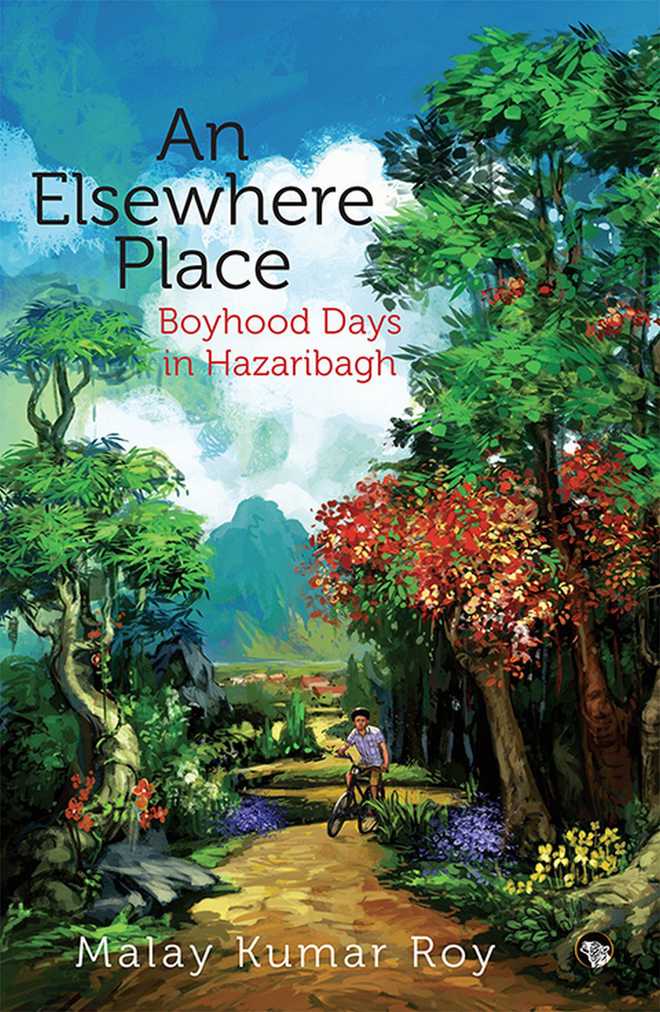
An Elsewhere Place: Boyhood days inHazaribagh by Malay Kumar Roy. Speaking Tiger. Pages 184. Rs 299
Sandeep Sinha
“You can take a man out of Hazaribagh, but not Hazaribagh out of a man,” so goes the saying in this quaint wooded town, the headquarters of North Chhotanagpur Division in Jharkhand.
Malay Kumar Roy, the author of the book, An Elsewhere Place — Boyhood Days in Hazaribagh, has lived up to this by penning memories of the decade he spent in this hill station-like town. Roy takes readers back to the idyllic days of yore that defined Hazaribagh, known for its rich forest bounty, glorious unpredictable weather and unhurried pace of life.
As memoirs go, the book has a section on people who mattered in everyday life. The mali, who despite the indignation of the author’s father, brooked no interference, and came up with a wondrous patch of white-laced chrysanthemums. There is the mention of Cheli, the daughter of Nanku Mahto, to whom the family takes a liking. The author’s mother gifts a pair of flower bangles and a newly-wed Cheli, all grown up, insists on going back to get it. It’s a bonding so characteristic of small towns and cities and the book has no dearth of descriptions of these bondings — Birju, Bhaglu, Sukhni, Samru, Haria and the milkman, the household help, who were treated as part of the family, all find a mention.
The author is apt in his description of the weather and forest life of Hazaribagh. In the Weather Report, Roy mentions instances of the unpredictable weather of the place which again is true, reflected in local sayings, “Mohan Talkies ka manager, aur Hazaribagh ka weather, kabhi bhi badal sakta hai.” (Mohan Talkies’ manager and Hazaribagh’s weather can change anytime).
The book vividly describes encounters with Bholu, the fox, Bahadur, the wolf, and the hyenas. I, myself, have seen hyenas near Canary Hills but Roy’s attachment is typical of childhood endearment, concern, nurture and innocence, evident in the description of a bear cub, tipsy on mahua leaves. So high was the bear cub that the author had to bring it home for safety before its mother could find him again. The account of Bholu is also a reminder of how attached we can get to animals we keep as pets. While nursing its injury to nurturing it into youthfulness, the author gets attached to the fox, who finally leaves him, preferring the call of the wild. As chance would have it, the author again comes across the fox on the highway near the sanctuary and Bholu has a mate by now. But the fox recognises its friend and pauses briefly in an indication of that friendship.
The author has not missed the major landmarks of
the town like the Canary Hill, the lake and the
Police Training Ground, located near his school. The account is a testimony to the yearning for the place.
But the most touching part of the book is, Mentors and Mates, in which Roy describes his days with the teachers at St Xavier’s School where he studied. How John Moore, an Australian Jesuit, rejected the idea of social distinction by admitting boys from different background, how he taught about the value of empathy in an increasingly impersonal world and how he urged his students not to fall for the ‘house, wife, car’ syndrome. Success is judged by integrity, he would say.
There is Father Kevin Grogg, who shared their world of boyhood, who never disciplined, but would make known he was disappointed by their actions. He taught about the power of curiosity and the instinct to take life not so seriously all the time. Don’t be impressed by yourself, leave it for the others, he would say.
The book frequently mentions visitors from Calcutta for it was a common practice in Bengal those days to go Paschim for a change, inviting the term “changers” for them. They were even called Damchi Babu for their propensity to say “damn cheap” when finding prices lower compared to Calcutta. Also, the area was a once part of the Bengal Presidency.
The book reminds of another work, Patna Roughcut by Siddhartha Chowdhury. But this one is much simpler, with no pretensions, no negativity and just seeks to be an attempt to relive the pristine days of an earlier generation, summed up by Roy’s friend Jojo Karlekar, “Hazaribagh touches a boy forever.”
Aye, Aye Mate! One can’t agree more.



























